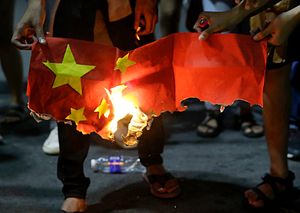The Philippine foreign secretary used Twitter to order the immediate filing of a diplomatic protest against China on Wednesday after Chinese coast guard ships reportedly neared a Philippine-occupied shoal in the disputed South China Sea.
Foreign Secretary Teodoro Locsin Jr., who is accompanying Philippine President Rodrigo Duterte on a visit to Russia, issued the normally confidential order to officials at the Department of Foreign Affairs. Relations between the Philippines and China have vastly improved under Duterte, but territorial rifts have remained a thorny issue.
The Philippine military chief and other officials have reported new activities by Chinese coast guard vessels at Second Thomas Shoal, where Filipino marines keep watch aboard a long-grounded navy ship. China claims almost the entire South China Sea, a strategic waterway where U.S. Navy ships and aircraft have patrolled for decades.
Locsin tweeted at his own department in all caps: “I’M IN MOSCOW. DO I HAVE TO FLY HOME TO FILE THE GODDAMNED DIPLOMATIC PROTEST MYSELF? THAT’S THE MILITARY SPEAKING. NOT SOME FRIGGIN’ CIVILIAN MEDIA OUTLET. FILE NOW!!!”
There was no immediate comment from Chinese Embassy officials in Manila. In the past they have claimed Chinese sovereignty over the shoal.
The Asia Maritime Transparency Initiative, a Washington-based think tank which monitors movements in the disputed waters, says Chinese coast guard ships routinely patrol Second Thomas Shoal, the Luconia Shoals off Malaysia, and Scarborough Shoal off the northwestern Philippines to project a Chinese presence in key areas which Beijing claims but where it does not have any permanent facilities.
Chinese coast guard ships have guarded Second Thomas from a close distance since 2013 in a quiet standoff with a small contingent of Filipino marines manning a rusty but still actively commissioned navy ship that Manila deliberately grounded in 1999 after China seized nearby Mischief Reef five years earlier.
China has demanded the Philippines pull out the World War II-era tank landing ship, the BRP Sierra Madre, and also warned Manila from undertaking construction in the area, a rich fishing ground. Manila has refused to withdraw its navy ship and has protested past Chinese blockades of Philippine vessels transporting supplies to the marines stationed at the shoal.
A team of Associated Press journalists allowed to travel aboard a small Philippine navy-manned resupply boat with other reporters in 2014 witnessed how one of at least three Chinese coast guard ships warned the boat by radio to back away from what it said was Chinese territory.
When the Philippine vessel persisted, a much larger Chinese coast guard ship maneuvered dangerously close to block its advance. The Philippine vessel, however, managed to move through rocky coral outcrops and reached the Sierra Madre.
Under Duterte, Chinese and Philippine officials have held talks to avoid such dangerous encounters, which have eased but continue to occur from time to time. A Philippine official told the AP that a Philippine resupply vessel was blocked by a Chinese ship at the shoal in May.
The official said Chinese coast guard ships wanted to ensure that Philippine resupply vessels en route to Second Thomas Shoal were not loaded with construction materials.
The Philippines strongly opposes such Chinese inspections of its ships in the vicinity of the shoal and will protest any such attempt, said the official, who spoke on condition of anonymity because of a lack of authority to speak publicly about the issue.
By Jim Gomez for the Associated Press, with additions by The Diplomat.
































